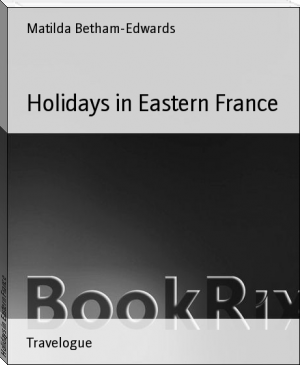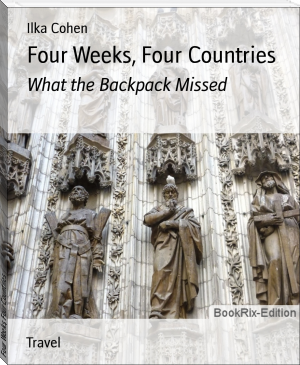East of Paris - Matilda Betham-Edwards (english readers .TXT) 📗

- Author: Matilda Betham-Edwards
Book online «East of Paris - Matilda Betham-Edwards (english readers .TXT) 📗». Author Matilda Betham-Edwards
CONTENTS
Chap.
INTRODUCTION
I.--MELUN
II.--MORET-SUR-LOING
III.--BOURRON
IV.--BOURRON--_continued_
V.--BOURRON--_continued_
VI.--LARCHANT
VII.--RECLOSES
VIII.--NEMOURS
IX.--LA CHARITE-SUR-LOIRE
X.--POUGUES
XL.--NEVERS AND MOULINS
XII.--SOUVIGNY AND SENS
XIII.--ARCIS-SUR-AUBE
XIV.--ARCIS-SUR-AUBE--_continued_
XV.--RHEIMS
XVI.--RHEIMS--_continued_
XVII.--SOULAINES AND BAR-SUR-AUBE
XVIII.--ST. JEAN DE LOSNE
XIX.--NANCY
XX.--IN GERMANISED LORRAINE
XXI.--IN GERMANISED ALSACE
INTRODUCTORY.
I here propose to zig-zag with my readers through regions of Eastern France not described in any of my former works. The marvels of French travel, no more than the _chefs-d'oeuvre_ of French literature, are unlimited. Short of saluting the tricolour on Mont Blanc, or of echoing the Marseillaise four hundred and odd feet underground in the cave of Padirac, I think I may fairly say that I have exhausted France as a wonder-horn. But quiet beauties and homely graces have also their seduction, just as we turn with a sense of relief from "Notre Dame de Paris" or "Le Pere Goriot," to a domestic story by Rod or Theuriet, so the sweet little valley of the Loing refreshes after the awful Pass of Gavarni, and soothing to the ear is the gentle flow of its waters after the thundering Rhone. Majestic is the panorama spread before our eyes as we pic-nic on the Puy de Dome. More fondly still my memory clings to many a narrower perspective, the view of my beloved Dijon from its vine-clad hills or of Autun as approached from Pre Charmoy, to me, the so familiar home of the late Philip Gilbert Hamerton. If, however, the natural marvels of France, like those of any other country, can be catalogued, French scenery itself offers inexhaustible variety. And so, having visited, re-visited, and re-visited again this splendid hexagon on the European map, I yet find in the choice of holiday resorts a veritable _embarras de richesses_. And many of the spots here described will, I have no doubt, be as new to my readers as they have been to myself--_Larchant_ with its noble tower rising from the plain, recalling the still nobler ruin of Tclemcen on the borders of the Sahara--_Recloses_ with its pictorial interiors and grand promontory overlooking a panorama of forest, sombre purplish green ocean unflecked by a single sail--_Moret_ with its twin water-ways, one hardly knows which of the two being the more attractive--_Nemours_, favourite haunt of Balzac, memoralized in "Ursule Mirouet"--_La Charite_, from whose old-world dwellings you may throw pebbles into the broad blue Loire--_Pougues_, the prettiest place with the ugliest name, frequented by Mme. de Sevigne and valetudinarians of the Valois race generations before her time--_Souvigny_, cradle of the Bourbons, now one vast congeries of abbatial ruins--_Arcis-sur-Aube_, the sweet riverside home of Danton--its near neighbour, _Bar-sur-Aube_, connected with a bitterer enemy of Marie Antoinette than the great revolutionary himself, the infamous machinator of the Diamond Necklace. These are a few of the sweet nooks and corners to which of late years I have returned again and again, ever finding "harbour and good company." And these journeys, I should rather say visits, East of Paris led me once more to that sad yearning France beyond the frontier, to homes as French, to hearts as devoted to the motherland as when I first visited the annexed provinces twenty years ago!
CHAPTER I
MELUN
Scores upon scores of times had I steamed past Melun in the Dijon express, ever eyeing the place wistfully, ever too hurried, perhaps too lazy, to make a halt. Not until September last did I carry out a long cherished intention. It is unpardonable to pass and re-pass any French town without alighting for at least an hour's stroll!
Melun, capital of the ancient Gatinais, now chef-lieu of the Department of Seine and Marne, well deserves a visit. Pretty as Melun looks from the railway it is prettier still on nearer approach. The Seine here makes a loop, twice curling round the town with loving embrace, its walls and old world houses to-day mirrored in the crystal-clear river. Like every other French town, small or great, Melun possesses its outer ring of shady walks, boulevards lying beyond the river-side quarters. The place has a busy, prosperous, almost metropolitan look, after the village just left. [Footnote: For symmetry's sake I begin these records at Melun, although I halted at the place on my way from my third sojourn at Bourron.] The big, bustling Hotel du Grand Monarque too, with its brisk, obliging landlady, invited a stay. Dr. Johnson, perhaps the wittiest if the completest John Bull who ever lived, was not far wrong when he glorified the inn. "Nothing contrived by man," he said, "has produced so much happiness (relaxation were surely the better word?) as a good tavern." Do we not all, to quote Falstaff, "take our ease at our inn," under its roof throwing off daily cares, assuming a holiday mood?
A survey of the yard awoke another train of reflections. It really seems as if the invention of the motor car were bringing back ante-railway days for the tourist and the travelling world, recalling family coach and post-chaise. The place was crowded with motor cars of all shapes and sizes, some of these were plain, shabby gigs and carts of commercial travellers, others, landaus, waggonettes and victorias of rich folks seeing the world in their own carriage as their ancestors had done generations before; one turn-out suggested royalty or a Rothschild, I was about to say, rather I should name a Chicago store-keeper, since American millionaires are the Haroun-el-Raschids of the twentieth century. This last was a sumptuously fitted up carriage having a seat behind for servants, accommodating eight persons in all. There was also a huge box for luggage. It would be interesting to know how much petroleum, electricity, or alcohol such a vehicle would consume in a day. The manufacture of motor cars must be a very flourishing business in France, next, I should say, to that of bicycles. Of these also there was a goodly supply in the entrance hall of the inn, and the impetus given to travel by both motor car and bicycle was here self-evident. The Hotel du Grand Monarque literally swarmed with tourists, one and all French folks taking their ease at their inn. And our neighbours do not take their pleasure solemnly after the manner of the less impressionable English. Stay-at-home as they have hitherto been, home-loving as they essentially are, the atmosphere of an inn, the aroma of a holiday, fill the Frenchman's cup of hilarity to overflowing, rendering gayer the gayest.
The invention and rapidly spreading use of the motor car in France shows the French character under its revolutionary aspect, yet no people on the face of the earth are in many respects so conservative. We English folks want a new "Where is it?" for social purposes every year, the majority of our friends and acquaintances changing their houses almost as often as milliners and tailors change the fashion in bonnets and coats. A single address book for France supplies a life-time. The explanation is obvious. For the most part we live in other folks' houses whilst French folks, the military and official world excepted, occupy their own. Revisit provincial gentry or well-to-do bourgeoisie after an interval of a quarter of a century, you always find them where they were. Interiors show no more change than the pyramids of Egypt. Not so much as sixpence has been laid out upon new carpets or curtains. Could grandsires and granddames return to life like the Sleeping Beauty, they would find that the world had stood still during their slumber.
Melun possesses perhaps one of the few statues that may not be called superfluous, and I confess I had been attracted thither rather by memories of its greatest son than by its picturesque scenery and fine old churches. The first translator of Plutarch into his native tongue was born here, and as we should expect, has been worthily commemorated by his fellow citizens. A most charming statue of Amyot stands in front of the grey, turreted Hotel de Ville. In sixteenth century doctoral dress, loose flowing robes and square flat cap, sits the great scholiast, as intently absorbed in his book as St. Jerome in the exquisite canvas of our own National Gallery.
Behind the Hotel de Ville an opening shows a small, beautifully kept flower garden, just now a blaze of petunias, zinnias, and a second crop of roses. Long I lingered before this noble monument, one only of the many raised to Amyot's memory, of whom Montaigne wrote:--
"Ignoramuses that we are, we should all have been lost, had not this book (the translation of Plutarch) dragged us out of the mire; thanks to it, we now venture to write and to discourse."
And musing on the scholar and his kindred, a favourite line of Browning's came into my mind--
"This man decided not to live but to know."
Indeed the whole of "A Grammarian's Funeral" were here appropriate. Is it not men after this type of whom we feel
"Our low life was the level's and the night's. He's for the morning"?
To my surprise I found the church of St. Aspais locked. A courteous hair-dresser thereupon told me that all churches in Melun were closed from noon till half past one, but that, as noon had only just struck, if I were brisk I might possibly catch the sacristan. After a pretty hot chase I succeeded in finding a deaf, decrepit, dingy old man who showed me round the church, although evidently very impatient for his mid-day meal. He informed me that this closing of churches at Melun had been necessitated of late years by a series of robberies. From twelve till half past one o'clock no worshippers are present as a rule, hence the thieves' opportunity. Unfortunately marauders do not strip beautiful interiors of the tinselly gew-gaws that so often deface them; in this respect, however, St. Aspais being comparatively an exception. Alike within and without the proportions are magnificent, and the old stained glass is not marred by modern crudities. I do not here by any means exhaust the sights of this ancient town, from which, by the way, Barbizon is now reached in twenty minutes, an electric tramway plying regularly between Melun and that famous art pilgrimage.
CHAPTER II.
MORET-SUR-LOING.
The valley of the Loing abounds in captivating spots, Moret-sur-Loing bearing the palm. Over the ancient town, bird-like broods a majestic church, as out-spread wings its wide expanse of roof, while below by translucent depths and foliage richly varied, stretch quarters old and new, the canal intersecting the river at right angles. Lovely as is the river on which all who choose may spend long summer days, the canal to my thinking is lovelier still. Straight as an arrow it saunters between avenues of poplar, the lights and shadows of wood and water, the sunburnt, stalwart barge folk, their huge gondoliers affording endless pictures. Hard as is undoubtedly the life of the rope tower, rude as may appear this amphibious existence, there are cheerful sides to the picture. Many of these floating habitations possess a fireside nook cosy as that of a Parisian concierge, I was never tired of strolling along the canal and watching the barge folk. One day a friend and myself found a large barge laden with coal at the head of the canal, the huge dark framework and its sombre burden lighted up with touches of grace and colour. At the farther end of the vessel was hung a cage of canaries, at the other end was a





Comments (0)